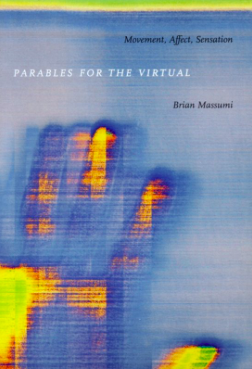Freedom of choice is not new for neoliberalism but, as Brian Massumi argues in The Power at the End of the Economy (2015), it is its main feature. It is its “magic touch guided by the principle of competition” (1). The idea of the Market, at least for modernity, is tied to the way freedom of choice has been developed as a mechanism connected to the way we rationalize our everyday lives. We choose our future, as much as we choose our present and past. What matters is that our decision stands as a solid bridge that brings together what we desire and what we want. The problem with all this, as Massumi argues, is that every rationalized decision is haunted by affect. The market, or markets, these days is (are) rational only in appearance. Today, markets “react more like mood rings than self-steering wheels, the affective factor becomes increasingly impossible to factor out” (2). This means that as late Michel Foucault argued the invisible hand of the market seems to be connecting the world in a “spontaneous synthesis,” therefore “the positive synthesis of market conditions occurs immanently to the economic field” (3). The end of the Economy, for Massumi, is when “what is most intensely individual is at the same time most wide-rangingly social” (4) and at the same time, when the invisible hand seems to be suffering from a “degenerative motor disease” (5). Power, at least in its state form, is less than a invisible hand these days, but also more than a phantasmatic prothesis. Power is working in the “infra-individual” and every infra-level of action strikes strongly at a macro level.
The panorama that Massumi describes for power after the end of economy, that is, once there is not outside of capitalism, is closer to the way the weather behaves. The individual, then, as part of the landscape is like a mountain, or any other geographical accident that both increases or reduces the strength of the weather. The power of the individual, however, is not dictated by its rational ability of choosing, it is determined by its “nonconsciousness” since this “becomes the key economic actor” (17). From that we have not only a disempowered individual but a radical change in the individual. Autonomy stops being a feature of the individual and “what is now autonomous is its decision” (19). We like doing things that are done by something through and with us. The personal vanishes and we are in an infra-desert of experience. This brave new world focus on “self-interest” which consist in making and keeping tight a “strict equation between life satisfaction and rational calculus of choice” (23). By no means this should comfort us. Our current state is merely a state that persist in self-satisfaction or its extended deferral at all levels: pleasure, pain, gain, success, sadness, depression, death, rush and so on. We have, as neoliberalist homo oeconomicus “a system in which [we] owe the positive nature of [our] calculation precisely to what eludes [our] calculation” (36). We can calculate all that par excellence eludes calculus; we can measure all that is unmeasurable. And, of course, the problem is that these operations would never end well.
Rationality created its traps and captured affect. One is free to choose its deferral of death. While all of this seems extremely pessimistic, for Massumi, it also means that different ways of struggle are liberated. Perhaps, in a same formula as the one evoked by Michael Hardt and Antonio Negri in Empire (2000), The Power at the End of the Economy suggests that what is at stake is abandon decision and supplant its rational features by an affective sympathy. That is, before placing reason at the top of our priorities, affect should dismantle hierarchies and recreating old paradigms. If capitalism has persisted for so long it is, for Massumi, because it has focused, wrongly, the importance of things in their quantity and quantification and not in its qualities and its qualifications. Life always will create, via events, a surplus. “Capitalism is the process of converting qualitative surplus value of life into quantifiable surplus value” (77), what is at stake with this is that there must be a way to stop converting the surplus value of life, manifested in experience, into quantifiable things, into a calculus that blindly gives answers. While Massumi offers a possible solution in a tone closer to Empire (as mentioned before), it is not clear enough how affect, or ontopower, would simply infect all common heroes —the anonymous masses that for Massumi have all the potential and imagination to make a change in the world— it is for sure important keep in mind that there is a difference between the qualitative surplus value of life and the quantitative capitalist surplus value. The first one is always a remainder, an excess, an uncountable, the second one is merely a false calculation, a persuasive trap. At the same time, if there is no economy, once affect became immanent, how would we learn of to differentiate again between surplus values without choosing?



